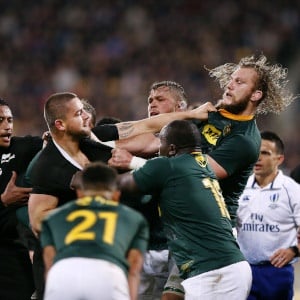|
Dane Coles of the All Blacks gets in a scuffle with RG Snyman of the Springboks during the 2019 Rugby Championship Test Match between New Zealand and South Africa at Westpac Stadium (Photo by Anthony Au-Yeung/Getty Images) |
“The proudest moment in the Mpumalanga Rugby Union’s history might also become our ultimate tragedy.”
Pieter Burger, the Pumas’ chief executive, is hardly being alarmist in spelling out the simple consequence of the union not being able to host the Springboks’ clash against the All Blacks at the Mbombela Stadium in Nelspruit later this year due to the Covid-19 pandemic.
With Sanzaar on Monday providing little clarity on the future of 2020’s Rugby Championship, the anxiety is becoming increasingly palpable.
One of South Africa’s canny underdog teams had been bursting with pride after SA Rugby announced the local itinerary for the tournament, a guaranteed financial windfall that would provide them with a vital nest egg for the future.
Now, with the virus plunging the game into austerity, the Pumas need the 26 September Test just to survive 2021.
“We’ll lose millions. I don’t need to tell anyone that. An All Blacks Test is a crown jewel for any union because you can basically guarantee all shareholders that it will be a sell-out,” Burger told Sport24.
“Everyone’s tearing their hair out over Covid-19’s inherent uncertainty, but for us this is now a proverbial matter of life-or-death. If we can’t generate some cash reserves as a buffer for next year’s expenses, we’ll be watching New Year’s sunrise and then promptly close our doors.”
While it seems increasingly unlikely that the Pumas will garner income from gate receipts – a bummer as the Mbombela Stadium boasts a capacity in excess of 41 000 – due to social distancing rules, they are now desperately banking on SA Rugby’s safety protocol plan convincing government to at least allow for a match behind closed doors.
“The hope is that we’ll have an answer from government by the end of the month. One thing that could count in our favour is that the match is schedule relatively late in the year,” said Burger.
“Of course I would love to sell tickets and suites, but that’s not realistic anymore. Just let the game be played! At least that allows for a broadcast, which brings in some money. At least then we can offer sponsors some sort of exposure, even if it’s just a sizeable TV audience. We can also then eliminate force majeure (unforeseeable circumstances allowing parties not to commit their contractual obligations).”
Indeed, sponsorship is the key pillar of the Pumas’ annual finances as smaller unions receive significant less from SA Rugby distributions than the so-called Big Five franchises.
In fact, approximately 70% of the Lowvelders’ revenue is derived from businesses willing to invest.
But there’s a huge risk inherent to that, one directly intensified by the pandemic.
“Our risk profile differs fundamentally from a Super Rugby franchise. Most of our valued sponsors are from the SMME (Small, Medium and Micro Enterprise Sector) sector. Everyone now knows how vulnerable those businesses are in the current economic climate,” said Burger.
“I’ve already had three of them requesting a payment holiday. It’s brutal out there.”
To compound matters, 85% of the Pumas’ sponsorship portfolio is up for renewal within the next few months.
“Face-to-face negotiations are impossible currently and you also have to make a provision that some of your commercial partners simply might not have the funds to recommit.
“And, should one need to pursue new agreements, what do I sell a sponsor if I can’t give them an All Black Test? All we can do is hope,” said Burger.


